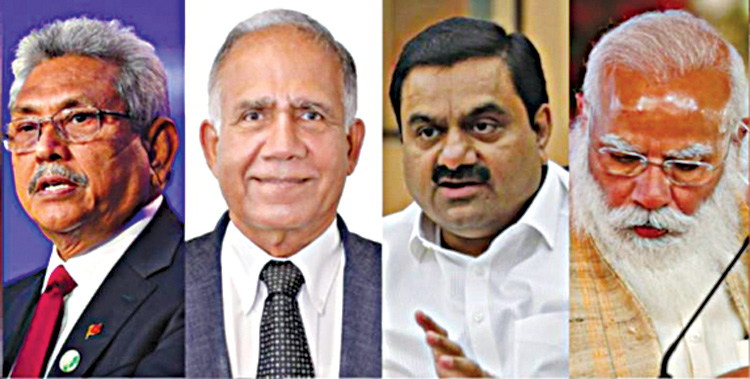Colombo/New Delhi, June 13 (FN Bureau) A controversial wind power deal in Sri Lanka involving India’s Adani Group has created a row on the island nation, and led to the resignation of the Chairman of Sri Lanka’s state-run Ceylon Electricity Board (CEB) M M C Ferdinando. Ferdinando resigned on Monday over a controversial statement attributed to him regarding a renewable energy deal with the Adani Group. “I have accepted the letter of resignation tendered to me by the CEB Chairman Mr M M C Ferdinando. Vice Chairman Nalinda Ilangaokoon will take over as the New Chairman CEB,” Energy Minister Kanchana Wijesekara tweeted Monday afternoon. Ferdinando had told Sri Lanka parliament’s Committee on Public Enterprises (COPE) that President Gotabaya Rajapaksa had told him that Prime Minister Narendra Modi had pressured him to hand over a wind power project to India’s Adani Group.
Following a swift denial by President Rajapaksa, Ferdinando withdrew his statement to COPE, claiming that he had made the remark in a moment of “pressure and emotion”. The CEB chairman’s speech had made headlines both in Sri Lanka and India. Ferdinando was quoted by Sri Lanka’s Newsfirst Television as saying he was not pressured by anyone to withdraw the statement. The Adani project is one of several which authorities were trying to approve without competitive tender. Last week the government changed the governing law of state-run Ceylon Petroleum Corporation to end competitive tendering, as opposition protested it will lead to widespread procurement scams. Ferdinando said he had mistakenly told the Parliamentary Watchdog COPE that the President told him that Indian Prime Minister Narendra Modi insisted that a Wind Power Project be awarded to the Adani Group. Speaking exclusively to News 1st, the CEB Chairman said he was very emotional when allegations were leveled at him at the Committee on Public Enterprises session on Friday (10). He said he was under pressure at the COPE session and admitted that he made a false statement. “I have withdrawn that statement,” he told News 1st. Ferdinando said he only realized that he mistakenly made such a comment, when the Minister inquired from him about the matter on Saturday (June 11) morning. Appearing at the Committee on Public Enterprises hearing in Parliament on Friday (June 10), Ferdinando said that following a meeting chaired by the President, he was summoned by the Head of State and was told that the Indian Prime Minister was insisting that the 500 MW wind power plant in Mannar be given to India’s Adani Group. “I told him (President) that this is not a matter related to me or the CEB and it should be referred to the Board of Investment,” he told COPE. The CEB Chairman said that he thereafter informed the Treasury Secretary in writing, and requested him to look into the matter while noting that there was a government to government requirement on the matter. However, he admitted that the agreement can be termed as unsolicited as it is a G2G agreement.
Sri Lankan President Gotabaya Rajapaksa categorically denied the statement made by the Chairman of the Ceylon Electricity Board with regard to awarding a Wind Power Project. “Statement made by the #lka CEB Chairman at a COPE committee hearing regarding the award of a Wind Power Project in Mannar, I categorically deny authorisation to award this project to any specific person or entity. I trust responsible communication in this regard will follow,” the President tweeted. In Parliament, Sri Lanka’s Opposition charged that an unsolicited government-to-government agreement to build a 500 MW wind power plant in the northern coast with the involvement of the Adani Group was the main reason to bring forward amendments to the 1989 Act. The main Opposition SJB wanted projects beyond 10 MW capacity to go through a competitive bidding process, but the majority of the government MPs voted against the clause. The ruling Sri Lanka Podujana Party has changed the governing law of Sri Lanka’s state-run Ceylon Petroleum Corporation last week to end competitive tenders for private renewable plants despite opposition protests. There were charges that Adani had proposed a wind plant to sell power at twice the market rate and that orders had come from high levels to make the deal happen, reports said.

